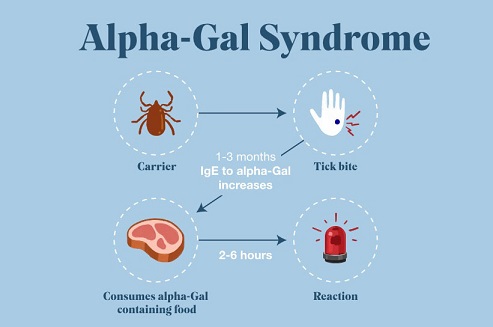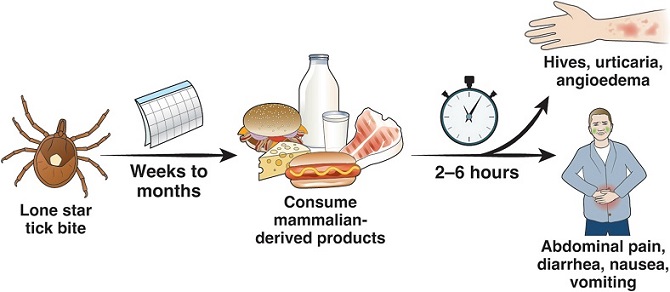Gastroenterology News: Many Having Unexplained Digestive Issues Are Unaware That They Could Be Suffering From Alpha-Gal Syndrome Caused By A Tick Bite!
Gastroenterology News - Alpha-Gal Syndrome - Lone Star Tick Mar 22, 2023 2 years, 10 months, 1 week, 6 days, 12 hours, 34 minutes ago
Gastroenterology News: Researchers from University of North Carolina at Chapel Hill-USA, Mayo Clinic, Florida-USA and University of Virginia, Charlottesville-USA are warning that more people are developing digestive issues due to a condition known as alpha-gal syndrome, a type of food allergy that is caused by the bite of the Lone Star Tick that is predominant in parts of the United States, Canada and Mexico and now also in parts of Europe, Asia and Australia due to heavy human movements around the globe as a result of travel and tourism or migration.
 Alpha-Gal Syndrome
Alpha-Gal Syndrome
Alpha-gal syndrome is an allergy that causes your body to react to eating meat from mammals and products made from mammals products. Symptoms usually start 2-6 hours after eating the mammalian meat or food.
Alpha-gal syndrome triggers an IgE-mediated response several hours after consuming beef, pork, or other mammal-derived meats and products. Initially identified in patients with anaphylaxis and urticaria, gastrointestinal (GI) alpha-gal is an increasingly recognized phenotype that presents with abdominal pain, diarrhea, nausea, and vomiting without significant skin, respiratory, or circulatory symptoms. It is crucial for gastroenterologists to recognize and diagnose this condition promptly and effectively.
Research on GI alpha-gal is is till in its early stages as the condition was only identified in 2008 in Southeastern United States.
https://www.termedia.pl/Alpha-gal-syndrome-the-first-report-in-Poland,10,45048,1,1.html
Clinically, the condition is hard to diagnose and many are unaware that they have this condition, let alone they could have been bitten by the lone start tick!
The allergen in alpha-gal syndrome is galactose alpha-1,3-galactose, an oligosaccharide found on the cells of all non-primate mammals.
Interestingly, sensitization to alpha-gal, or the development of IgE antibodies to the sugar, is believed to occur after a tick bite or parasitic infection. In the United States, the Lone Star tick, an ectoparasite with deer as its primary host, has been strongly implicated.
The proposed pathophysiology is as such….upon consumption of mammalian meat or mammal-derived products, the GI tract absorbs the alpha-gal antigen bound to fat in a glycolipid, which is then incorporated into chylomicrons and enters the bloodstream within about 2 hours. The alpha-gal antigen subsequently binds to IgE antibodies on mast cells abundant in the GI tract, causing these cells to release histamine and other mediators. These mediators then act on sensory nerve endings, triggering pain, inducing contractions in intestinal smooth muscles, and stimulating mucous secretion from mucous glands.
Observational studies conducted by GI specialists have documented cases of GI alpha-gal syndrome. In these studies, 16 alpha-gal IgE+ GI clinic patients in North Carolina and 359 in Virginia were examined. Approximately three-quarters of the patients reported symptom improvement when following an alpha-gal avoidance diet, and several experienced a recurrence of GI symptoms after consuming mammalian meat. Additionally, isolated GI reactions have been noted in alpha-gal-allergic
patients during oral food challenges.
https://pubmed.ncbi.nlm.nih.gov/33524403/
https://pubmed.ncbi.nlm.nih.gov/33655311/
https://pubmed.ncbi.nlm.nih.gov/24656556/
https://pubmed.ncbi.nlm.nih.gov/30144162/
In studies involving 91 patients with confirmed alpha-gal allergies, the most prevalent GI symptoms were abdominal pain (affecting 71% of all patients) and vomiting (affecting 22%). Notably, 40.7% of these patients experienced only GI symptoms.
https://pubmed.ncbi.nlm.nih.gov/24656556/
https://pubmed.ncbi.nlm.nih.gov/30144162/
Management of patients diagnosed with alpha-gal syndrome primarily involves eliminating alpha-gal (The sugar molecule: galactose-α-1,3-galactose) ifrom their diet.
This includes avoiding mammalian meats and products like pork, beef, venison, lard, butter, and milk. Dairy products with high fat content, such as ice cream, cream, and cream cheese, also contain smaller amounts of alpha-gal. Fish, seafood, poultry, and fowl are acceptable, but gelatin-containing foods and cross-contaminated processed foods may cause issues.
Gastroenterology News and study coverages are indicting that the incidence of Alpha-Gal Syndrome is increasing over the years.
https://www.frontiersin.org/articles/10.3389/fcimb.2021.680264/full
https://www.nytimes.com/2022/05/13/us/lone-star-tick-bite-meat-allergy.html
Gastroenterologists should collaborate with local dieticians and raise awareness about the syndrome.

In case of accidental exposure, patients should inform a reliable person, take diphenhydramine, and have access to self-injectable epinephrine if symptoms worsen.
Some acupuncture clinics may advertise cures, but no controlled studies support their effectiveness.
Alpha-gal-allergic individuals should avoid further tick bites, as they may worsen the allergy.
Measures to reduce tick bites include performing tick checks, showering after activities in wooded areas, and treating clothing and boots with permethrin. Some medications and medical products contain alpha-gal and may cause reactions in sensitized or allergic individuals.
Alpha-gal-allergic patients should also be cautious with bioprosthetic medical devices. Revivicor is developing alpha-gal-free medical devices and has recently provided alpha-gal-knockout pig kidneys for successful xenotransplantation. Their FDA-approved alpha-gal-free pork for human consumption is not yet widely available.
The Lone Star Ticks
Lone star ticks (
Amblyomma americanum) are a species of tick found predominantly in the southeastern and eastern United States and now in many geolocations across the world.They are named for the distinctive white spot on the back of adult females, which resembles the shape of the state of Texas. Lone star ticks are known for their aggressive behavior, feeding on a variety of hosts, including humans, rodents, dogs, and deer. They are also known to carry diseases such as Rocky Mountain spotted fever, tularemia, and the food allergy called alpha-gal syndrome.
Habitat modification and the removal of animal hosts are key to lone star tick removal. Keep grass cut low, and trim back vegetation along trails, paths, and yard edges. Remove debris and ground cover to discourage rodents from making the yard their home. If you suspect a lone start tick problem on your property, contact a licensed pest control professional.
Alpha-Gal Syndrome Clinical Practice Update
The American Gastroenterological Association (AGA) has released new clinical guidance to help physicians and patients identify if unexplained digestive symptoms are due to alpha-gal syndrome, a food allergy that is caused by lone star tick bites. The AGA Clinical Practice Update is published in the peer reviewed medical journal:
Gastroenterology.
https://www.cghjournal.org/article/S1542-3565(23)00040-X/fulltext
For the latest
Gastroenterology News, keep on logging to Thailand Medical News.

